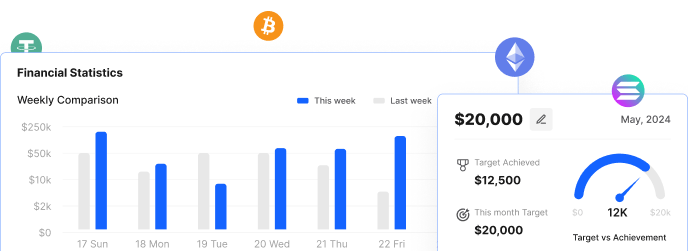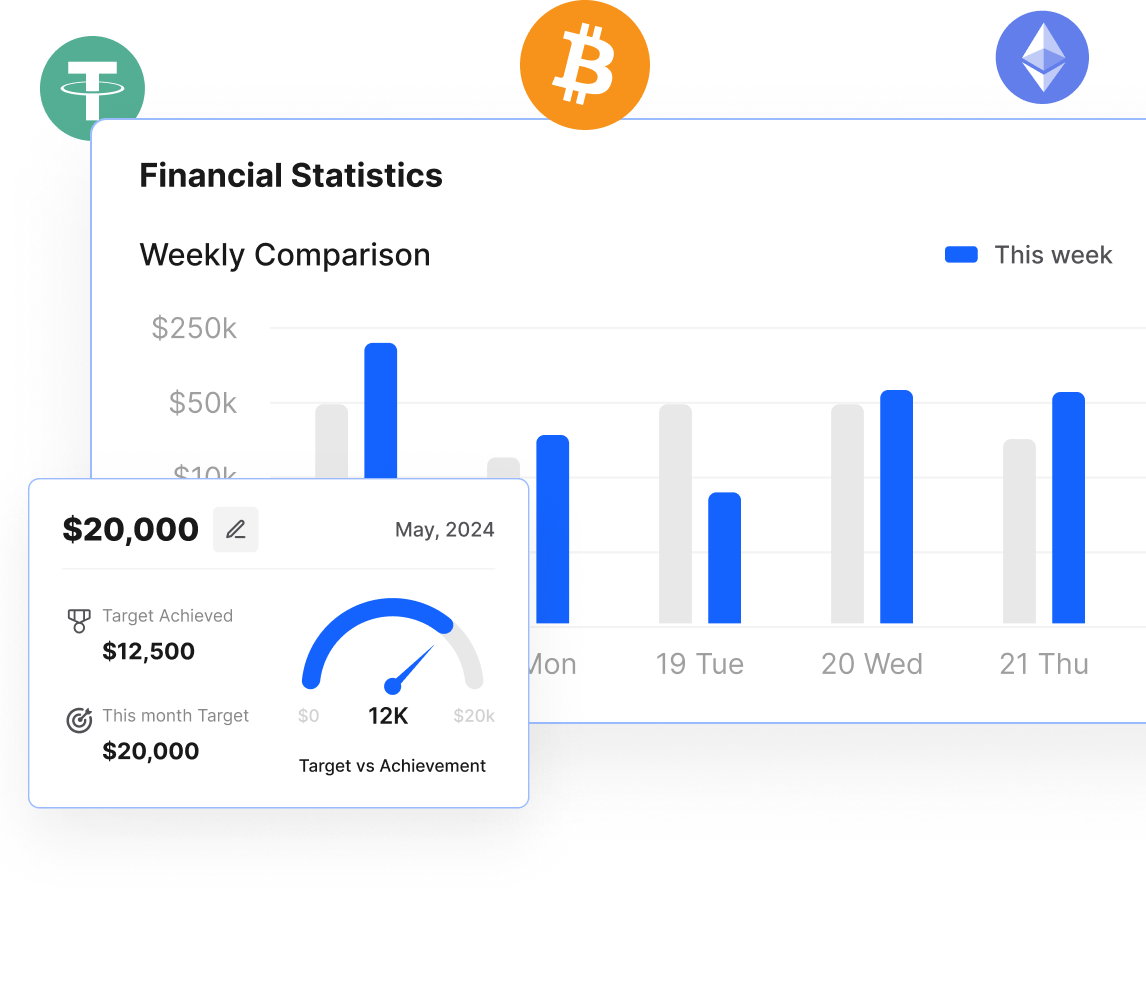Enterprise-Grade Cryptocurrency Tax Accountant Near Me
Modern Crypto Accounting & Compliance for Web3 Teams, Funds, and Fintechs
Businesses searching for a cryptocurrency tax accountant near me need more than tax prep. You need a partner who can reconcile multi-chain data, support entity-level reporting, and provide clear GAAP/IFRS treatment of digital assets. Scale your business with clean accounting and tax reporting.
- 8+ years of crypto-native accounting experience
- Systems built for multi-wallet, multi-chain volumes
- Audit-ready, investor-grade financial reporting


JUST A FEW OF THE COMPANIES WE’VE SUPPORTED OVER THE YEARS
Why B2B Clients Choose OnChain Accounting
Accurate Business Tax Reporting for Digital-Asset Operations
General accountants aren’t trained to handle crypto. Crypto transactions require accurate categorization, cost basis tracking, and IRS-compliant reporting. With activities spanning staking rewards, NFT trades, and DeFi protocols, even a small oversight can lead to audits, back taxes, and penalties. If you are searching for a cryptocurrency tax accountant near me, what you truly need is a partner who understands how to classify digital-asset activity for businesses.
The expert team of cryptocurrency tax accountants at OCA brings years of experience supporting companies that operate with digital assets. With deep expertise in cryptocurrency accounting, we help finance teams create accurate, audit-ready records across wallets, chains, and on-chain activities. Our role extends far beyond preparing IRS-compliant filings. We help businesses establish reliable accounting systems that support long-term operational growth.
When you work with us, you get:
- Accurate multi-chain financial reporting for all wallets, protocols, and platforms
- Proper classification of staking, validator rewards, token activity, and treasury movements
- Complete preparation of Form 8949, entity returns, and all supporting documentation
- Strategic tax planning guidance to structure crypto transactions efficiently for your business
We stay current with IRS digital asset rules and emerging accounting standards so your filings remain compliant and your financials stay reliable. With a trusted specialist in cryptocurrency accounting providing expertise, you’ll save time, reduce stress, and undoubtedly, minimize tax liability.

Challenges of Tracking Digital Asset Activity
Why Cryptocurrency Accounting Is Complex for Businesses
The IRS treats digital assets as property. For companies without cryptocurrency accounting services, these challenges lead to inconsistent records, valuation errors, audit exposure, and financial statements leadership cannot trust.
Cost basis must be preserved across chains, wallets, and smart contracts.
Businesses transact across multiple wallets and protocols, creating fragmented data. Each transfer, swap, or contract interaction affects cost basis. If even one movement is misclassified, financial statements and tax filings become unreliable. A cryptocurrency tax accountant ensures the cost basis is tracked consistently across your entire digital asset lifecycle.
Fair market value (FMV) must be captured at exact timestamps.
Digital assets trade 24/7, and valuation must reflect the precise moment a transaction occurs. Incorrect FMV leads to misstated income, gains, and balance-sheet values. Professional cryptocurrency accounting requires automated and validated FMV capture for audit-ready accuracy.
Complex on-chain events create multiple accounting impacts.
Staking, validator rewards, liquidity pool activity, token vesting, or protocol fees each trigger unique income, expense, or asset classification requirements. Without crypto-native accounting expertise, businesses risk misreporting high-impact financial events.
Internal transfers must be reconciled to avoid phantom gains.
Treasury movements between wallets are not taxable, but missing acquisition data or poor documentation can make them appear as disposals. This creates false capital gains and material misstatements on financial reports. A dedicated cryptocurrency accountant maintains clear tracing and internal controls.
Exchanges, wallets, and protocols lack standardized reporting.
Most platforms do not provide GAAP-ready exports, consistent labels, or complete transaction histories. Multi-chain activity multiplies this problem. Accurate cryptocurrency accounting requires reconstructing data, normalizing formats, and producing a clean, auditable sub-ledger.
Cost basis must be preserved across chains, wallets, and smart contracts.
Businesses transact across multiple wallets and protocols, creating fragmented data. Each transfer, swap, or contract interaction affects cost basis. If even one movement is misclassified, financial statements and tax filings become unreliable. A cryptocurrency tax accountant ensures the cost basis is tracked consistently across your entire digital asset lifecycle.
Fair market value (FMV) must be captured at exact timestamps.
Digital assets trade 24/7, and valuation must reflect the precise moment a transaction occurs. Incorrect FMV leads to misstated income, gains, and balance-sheet values. Professional cryptocurrency accounting requires automated and validated FMV capture for audit-ready accuracy.
Complex on-chain events create multiple accounting impacts.
Staking, validator rewards, liquidity pool activity, token vesting, or protocol fees each trigger unique income, expense, or asset classification requirements. Without crypto-native accounting expertise, businesses risk misreporting high-impact financial events.
Internal transfers must be reconciled to avoid phantom gains.
Treasury movements between wallets are not taxable, but missing acquisition data or poor documentation can make them appear as disposals. This creates false capital gains and material misstatements on financial reports. A dedicated cryptocurrency accountant maintains clear tracing and internal controls.
Exchanges, wallets, and protocols lack standardized reporting.
Most platforms do not provide GAAP-ready exports, consistent labels, or complete transaction histories. Multi-chain activity multiplies this problem. Accurate cryptocurrency accounting requires reconstructing data, normalizing formats, and producing a clean, auditable sub-ledger.
Scalable Cryptocurrency Accounting for Crypto-Native and Traditional Organizations
For Web3 Startups & Technology Companies
Emerging and growth-stage Web3 organizations need to manage complex cryptocurrency activity across multiple wallets and protocols. We support your finance team with crypto bookkeeping, entity-level tax compliance, audit-ready financials, and clear reporting for investors. As your operations scale, the cryptocurrency accounting management process will also expand accurately.

For Crypto Funds, Investment Firms & Digital Asset Managers
Funds executing high-volume or multi-chain strategies require precise cost basis tracking, realized/unrealized gains, NAV reporting, and consistent valuation methods. Our specialists maintain accurate ledgers, prepare tax filings, and deliver the documentation your auditors and limited partners expect.

For DAOs & Distributed Treasury Teams
DAOs operate decentralized treasuries with complex financial flows. We provide multi-wallet reconciliation, grant and incentive tracking, treasury reporting, and structured accounting for governance-driven transactions. You receive transparent financial statements that support community oversight and long-term sustainability.

For Fintechs, Payment Platforms & Infrastructure Providers
If your product involves crypto payments, settlement flows, or customer-facing digital asset activity, you need a system that reconciles every transaction across chains. We classify revenue, track FMV at receipt, manage payables/receivables, and ensure all activity maps cleanly into your accounting system for accurate financial reporting.

For Validators, Staking Providers & Node Operators
Nodes, validators, and staking operations create recurring onchain income that must be valued and recorded accurately. We categorize rewards, track fair market value (FMV) at receipt, manage operational expenses, and document income streams for audit and tax compliance.

For Enterprises Holding or Transacting in Digital Assets
Traditional companies with crypto on the balance sheet need accurate valuation, risk documentation, and audit-ready reporting aligned with emerging accounting standards. Your treasury teams will be supported with fair-value measurement, internal controls, entity-level tax filings, and end-to-end cryptocurrency accounting for all digital asset activity.

For Organizations Needing Crypto Financial Reconstruction
If your company has historical crypto activity with incomplete or inconsistent records, we reconstruct wallet histories, normalize onchain data, and build a clean sub-ledger so your finance team faces no issues. This includes multi-year cleanup, documentation packages, and entity-level amendments.

Are You a Crypto Mining Business? Understand Your Tax Obligations.
Cryptocurrency mining is a taxable activity for companies operating mining equipment, validator nodes, or large-scale infrastructure. Let’s report income accurately, apply the correct deductions, and stay compliant with IRS expectations for digital asset activity.
How Are Crypto Mining Rewards Taxed?
If your business mines cryptocurrency, there are two main taxable events to consider:
- Income tax upon receipt of mining rewards:
The fair market value (FMV) of each reward at the time it is received determines the amount of income your business must recognize. This income is reported at the entity level and must reflect accurate valuation as part of your cryptocurrency accounting process. - Capital gains tax upon disposal of your mining rewards:
If the mined cryptocurrency is later sold, traded, or used in operations, it becomes a disposal event. These transactions generate capital gains or losses based on the difference between the asset’s fair market value (FMV) at the time it was mined and its value at disposal.
Capital Gains/Loss = Fair Market Value at Sale - Cost Basis
The same rules apply to staking rewards or validator revenue.
Mining rewards are taxed as ordinary income when received. That FMV becomes the cost basis, and only subsequent changes in value are subject to capital gains tax. Accurate tracking is needed to avoid misreporting.

When Do Mining Companies Owe Additional Business Taxes?
If mining is operated as a business, the IRS treats mining rewards as business income. This means tax obligations extend beyond basic income reporting.
Mining operations may be subject to:
- Entity-level income tax
- Self-employment tax for sole-member entities
- Payroll and employment-related taxes (depending on structure)
- Quarterly estimated tax obligations
Factors indicating business activity include:
- Intent to operate at a profit
- Continuous mining operations
- Investment in mining hardware and infrastructure
- Regular maintenance and electricity usage tied to mining
Business structures such as LLCs, partnerships, and corporations each have different filing requirements (e.g., Form 1120 or 1065). Professional guidance makes sure these requirements align with your mining operations and financial reporting.

What Can Mining Businesses Deduct on Their Taxes?
Mining companies can deduct operational expenses related to generating mining income. Common deductions include:
- Mining equipment: ASICs, GPUs, rigs, and supporting hardware
- Electricity costs: The portion of usage directly tied to mining activity
- Facilities or hosting costs: Physical space, cooling, ventilation
- Internet and network infrastructure: Business-use allocations
- Repairs and maintenance: Equipment upkeep and replacement
- Depreciation: Hardware depreciation under applicable tax rules
Tax laws around crypto mining deductions are quite complicated. For example, there are depreciation rules for hardware. By working with an experienced cryptocurrency tax accountant near me, you ensure that your tax filings are compliant with maximum deductions.

Cryptocurrency Accounting Services to Keep Your Business IRS-Compliant
Crypto Tax Return Filing
File accurate, IRS-ready entity returns. No more guesswork with your organization’s multi-wallet and multi-chain activity.
DeFi & Staking Income Reconciliation
We track and report income from staking, yield strategies, and liquidity pools so your business stays compliant and avoids unexpected tax exposure.
NFT Tax Reporting
Buying, selling, or generating NFT-based revenue? We make sure all activity is properly categorized, valued, and documented for business tax filings.
Crypto Mining Income Classification
If your company operates mining or validator equipment, you’ll owe taxes on rewards based on fair market value at the time received.
Amended & Prior-Year Returns
Made a mistake or skipped a year? We fix errors and help you catch up without penalties.
Audit Assistance & IRS Response
If your organization receives an IRS notice, our cryptocurrency tax accountants step in to manage the response, prepare supporting documentation, and defend your reporting positions.
Seamless Software Integration
We integrate your crypto sub-ledger with your accounting systems, improving accuracy and reducing the time your finance team spends reconciling digital asset activity.
Crypto Tax Return Filing
File accurate, IRS-ready entity returns. No more guesswork with your organization’s multi-wallet and multi-chain activity.
DeFi & Staking Income Reconciliation
We track and report income from staking, yield strategies, and liquidity pools so your business stays compliant and avoids unexpected tax exposure.
NFT Tax Reporting
Buying, selling, or generating NFT-based revenue? We make sure all activity is properly categorized, valued, and documented for business tax filings.
Crypto Mining Income Classification
If your company operates mining or validator equipment, you’ll owe taxes on rewards based on fair market value at the time received.
Amended & Prior-Year Returns
Made a mistake or skipped a year? We fix errors and help you catch up without penalties.
Audit Assistance & IRS Response
If your organization receives an IRS notice, our cryptocurrency tax accountants step in to manage the response, prepare supporting documentation, and defend your reporting positions.
Seamless Software Integration
We integrate your crypto sub-ledger with your accounting systems, improving accuracy and reducing the time your finance team spends reconciling digital asset activity.
FAQs
Your Questions, Answered
What does a cryptocurrency tax accountant near me do for corporate digital asset reporting?
A cryptocurrency tax accountant helps your business reconcile all crypto transactions by applying correct fair-value measurements, classifying revenue and expenses, and preparing entity-level tax filings. As a result, all your tax filings will be accurate, compliant, and supported by documentation that auditors and tax authorities expect.
How does cryptocurrency accounting work for companies with multi-wallet and multi-chain activity?
Corporate crypto activity requires aggregating data from wallets, exchanges, Layer-2 networks, and smart contracts into a unified sub-ledger. Each transaction must be classified, valued at the correct timestamp, and mapped to your chart of accounts. This structure allows finance teams to complete month-end close and maintain clean audit trails with accurate statements.
How should digital assets be valued and presented under U.S. GAAP (Generally Accepted Accounting Principles)?
Under current GAAP guidance (ASC 350-60), many digital assets are measured at fair value with changes recorded in net income. Your business must capture accurate fair market value (FMV), apply consistent valuation sources, and disclose methods as well as risks clearly. Our team makes sure that your cryptocurrency accounting reflects the required presentation and documentation for auditors and stakeholders.
How do businesses handle taxes on staking, validator rewards, or protocol income?
Onchain rewards are treated as income when received and must be valued at fair market value. When those assets are later sold or used, capital gains or losses apply. We classify, value, and document each reward event so entity-level filings remain accurate and defensible.
How do you support enterprise audits involving digital assets?
We prepare audit-ready documentation packages that include valuation reports, cost basis schedules, transaction classifications, reconciliation logs, and sub-ledger detail. Our accounting framework is designed in such a manner that your auditors receive complete support and clear evidence for every digital asset position.
Can you support companies with international digital asset exposure and U.S. tax obligations?
Yes. Many international organizations operate with U.S. based exchanges or investors, creating U.S. tax and reporting obligations. We support cross-border cryptocurrency accounting, FBAR/FATCA-related requirements, and entity-level filings so that global operations remain compliant.







